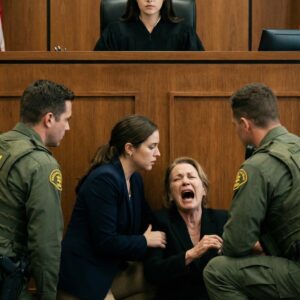My name is Clare, and at 28, I had become intimately familiar with the corrosive nature of grief and greed. Three years ago, the twin pillars of my life, my beloved grandparents Helen and Robert, passed away within months of each other. Their departure left a void that felt vast and unfillable, but they also left me a legacy—their beautiful, rambling Victorian home in Portland, Oregon, and the entirety of their estate, valued at just over $900,000. I was the one who had sat with them through quiet evenings, the one who made sure their pantry was always stocked, the one whose hand they held in the sterile quiet of hospital rooms. I was simply the one who had been there.
My sister, Julia, three years my senior, had been conspicuously absent for the better part of a decade. Her life was a carefully curated performance for a social media audience that never materialized, a whirlwind of fleeting trends and hollow aspirations. My parents, Karen and Michael, were her primary sponsors and most ardent fans. Julia was the sun around which their world orbitated—effervescent, beautiful, and constitutionally incapable of fault. I, the quiet, methodical daughter with a predictable career in accounting, was merely a satellite, reliable but unexciting.
The reading of the will was an exercise in barely concealed shock and immediate resentment. My parents had arrived expecting a windfall, Julia a blank check for her next venture. But my grandparents, in their quiet wisdom, had seen the truth of things. The will was clear, concise, and ironclad: everything was left to me, their “devoted and loving granddaughter, Clare, who gave her time and her heart, the only currency that ever truly mattered.”
The house was more than just an asset; it was a sanctuary, a living museum of my happiest memories. A 1920s Victorian marvel with floors that groaned with stories, and stained-glass windows that threw jewels of light across the rooms. It smelled of my grandmother’s lavender polish and my grandfather’s pipe tobacco. This, combined with their savings, investments, and life insurance, was a gift of staggering generosity. It should have been a moment of pure, unburdened relief. Instead, a cold knot of anxiety tightened in my gut.
My family’s reaction was the canary in the coal mine. There were no words of comfort, no shared tears for the loved ones we’d lost. The moment the lawyer left, the questions began, sharp and avaricious. “So, what’s the plan for splitting it?” my father asked, as if it were a foregone conclusion. Julia, with an astonishing lack of tact, cornered me in the kitchen. “You’re obviously going to do the right thing and give me half, right? It’s only fair.”
That was the moment the last vestiges of my filial naïveté died. I saw them not as family, but as predators circling what they believed was an easy kill. I knew I had to protect not just the assets, but the sanctuary my grandparents had entrusted to me. The next day, I found myself in the quiet, book-lined office of David Morrison, an estate lawyer with a reputation for being as sharp as a scalpel.
“Your instincts are spot-on, Clare,” he said, his steepled fingers hiding a thoughtful frown after I laid out the situation. “Familial greed is one of the oldest and ugliest stories in the book. A will can be contested, signatures can be forged, and undue influence can be alleged, however baseless. We need to build a fortress.”
His solution was an irrevocable trust. It was a brilliant, elegant piece of legal armor. We established the “Helen & Robert Thompson Legacy Trust,” transferring the house deed and the bulk of the liquid assets into its protection. I was named the sole beneficiary, but David, as the trustee, held the legal authority. No sale, no transfer, no change of ownership could occur without his signature. It was a clean, decisive move that rendered the estate untouchable by conventional means of coercion or fraud. I left enough in my personal accounts for a comfortable life and extensive renovations, but the vast majority was secure.
I poured my heart and a significant portion of my accessible funds into the house, restoring it to its former glory. For two years, a fragile peace settled. My family’s attacks were relegated to passive-aggressive barbs at holiday gatherings—snide remarks about “Clare’s palace” and how nice it must be to “not have to worry about money.” I absorbed them, knowing my fortress was secure. I had underestimated, however, their willingness to abandon conventional tactics and descend into outright criminality.
Last Wednesday, the peace shattered. I came home from work to the unnerving sight of Julia and my mother, Karen, standing on my front porch. They were a matched set of smug entitlement, their expressions identical, predatory smirks.
“Hello, Clare,” Julia chirped, her voice a weaponized form of sweetness. “We have some things to discuss. It’s important.”
A feeling of dread washed over me, but I unlocked the door. They swept into my living room, their eyes critically scanning the renovations I had so lovingly completed. “You’ve certainly been busy spending their money,” my mother commented, her words a thinly veiled accusation.
“What do you want?” I asked, my voice betraying more weariness than I intended.
Julia turned, her smirk widening into a malicious grin. She pulled a thick manila folder from her designer handbag and tossed it onto the coffee table. “Well, Clare, we have some rather significant news,” she announced, her tone dripping with rehearsed triumph. “We’ve had the house legally signed over into my name. The paperwork is all finalized. You need to be out by Friday.”
The air left my lungs. For a moment, the sheer audacity of it left me speechless. “Excuse me?”
“You heard her,” my mother stepped forward, her arms crossed, a general looking down on a defeated soldier. “This house belongs to Julia now. It’s a lesson for you, really. Some people just don’t deserve to have nice things.”
My mind, the accountant’s mind, began methodically searching for logic in the absurdity. “How? How could you possibly think you’ve accomplished that?”
“Oh, it wasn’t that difficult once we hired a competent lawyer,” Julia said, feigning boredom as she examined her perfectly manicured nails. “He uncovered some of Grandma and Grandpa’s old business debts. Significant ones. Since you were clearly mismanaging the estate and failing to address these liabilities, we had to step in. The house was used as collateral to settle the debts, and I was able to purchase it from the creditors for a very, very reasonable price.”
The lie was so elaborate, so detailed, it was almost impressive. “That’s impossible,” I stated, my voice regaining its strength. “I settled the estate myself with David. There were no outstanding debts. None.”
“According to who?” my mother snapped. “You? A 28-year-old girl who doesn’t know the first thing about the real world? We had professionals involved, Clare. Real lawyers who know how these things work.”
Julia slid a document from the folder. It looked vaguely official, with what was meant to be a court seal at the top. “See? It’s all here in black and white. Legally transferred. The house is mine.”
I picked up the paper, my fingers surprisingly steady. The letterhead font was slightly off. The seal was flat, a poor photocopy. But I held my tongue, playing my part. “And where, exactly, am I supposed to live?”
“That sounds like a ‘you’ problem, not an ‘us’ problem,” Julia said with a dismissive shrug.
As if on cue, the front door opened and my father, Michael, walked in, a key he had obviously copied in his hand. “This is going to be perfect for Julia’s new lifestyle brand,” he announced, beaming. “She needs this more than you do, Clare. You’re resilient. You can start over from scratch.”
“She’s a struggling artist,” my mother added, a note of faux-tragedy in her voice.
A bitter laugh escaped my lips. “Struggling? Julia spent more on a single handbag last month than I spend on groceries in half a year.”
“That’s not the point,” my father said, his voice hardening into the familiar tone of paternal decree. “The point is, this house represents a family legacy. It should have benefited all of us. Your grandparents were old. They were clearly confused when they wrote that will.”
I looked at the three of them, a united front of delusion and avarice. And in that moment, the fear and anxiety vanished, replaced by a strange, cold calm. I smiled, a genuine, slow smile that seemed to unnerve them.
“After everything I’ve had to learn about this family,” I said softly, “did you really, for one second, think I would let that happen?”
Julia’s smirk faltered. A flicker of uncertainty crossed her face. “What is that supposed to mean?”
“It means,” I said, my gaze sweeping over all three of them, “that you might want to have your ‘competent lawyer’ double-check his work. Very carefully.”
They left fuming, shouting final warnings that the movers would be there Friday at nine, and that any of my possessions left behind would be considered a donation to Julia’s new, more deserving life. The moment their car peeled away from the curb, I was on the phone with David Morrison.
“It’s even worse than we anticipated,” he said, a grim tone in his voice after I relayed the conversation. “What they’re claiming is a legal impossibility. The trust is an iron wall. Those documents they have are, without a doubt, fraudulent.”
“That’s what I thought. The seal was a photocopy.”
“This isn’t just a civil matter anymore, Clare,” David continued, his voice hardening. “This is felony document fraud, conspiracy to commit theft, and attempted grand larceny. We need to go to the police immediately.”
“No,” I said, a plan crystallizing in my mind. “Not yet. If we confront them now, they’ll play dumb. They’ll blame the lawyer, claim it was all a terrible misunderstanding. They’ll walk away with a slap on the wrist and try something else later. I want this to be the end.”
There was a long pause on the other end of the line. “What are you proposing?”
“I want to let them play it out,” I said. “Let them show up with their movers and their fake lawyer. Let them attempt to physically take possession of the property. Then there’s no misunderstanding. It’s a clear, undeniable criminal act, caught in the act.”
David was silent for another moment. “That’s… bold, Clare. And legally, it’s brilliant. It moves them from conspiracy to active commission. We’ll have them cold. I’ll make the necessary calls. You won’t be alone on Friday.”
Friday morning arrived with a crisp, clear Oregon sky. I made myself a cup of coffee and sat in the bay window of my living room, surprisingly serene. At precisely 9:00 a.m., a large moving truck from a reputable local company rumbled to a stop at the curb. Behind it, Julia’s gleaming white BMW and my parents’ silver SUV parked like outriders. The three of them emerged, followed by a man in an impeccably tailored, slightly-too-shiny suit, carrying a leather briefcase. He oozed the kind of confidence that only comes from being profoundly incompetent.
Julia, beaming with triumph, rang the doorbell. “Good morning, sleepyhead,” she sang out. “I do hope you’re packed. The men are on the clock.”
I opened the door, leaning against the frame. “Actually,” I said calmly, “I’m not going anywhere.”
The man in the suit stepped forward, his expression a mask of condescending professionalism. “Miss Clare Thompson, my name is Richard Blackwood, legal counsel for your sister, Miss Julia Thompson. I have here a court-sanctioned order of transfer and a writ of possession. You are legally required to vacate the premises immediately. If you refuse, we will be forced to have you removed by the police.”
“The police, you say?” I mused. “How fascinating. Please, come in. I’d love to see these powerful documents of yours.”
They filed into my home, their smugness practically a physical presence. Richard Blackwood snapped open his briefcase on my dining room table. “These are the corrected and finalized estate documents,” he announced. “As you can see, significant errors in the original probate process were discovered, which necessitated the liquidation of the primary asset—this house—to satisfy previously undisclosed liabilities.”
I slowly picked up each document, taking my time to photograph every page with my phone, the camera shutter sounding unnaturally loud in the quiet room. “These are very thorough. May I ask which law firm prepared them?”
“Blackwood and Associates,” he declared with a proud puff of his chest. “We specialize in complex estate corrections.”
“And you are all absolutely confident in the legitimacy and legal standing of these papers?” I asked, looking from Blackwood to my sister, and then to my parents.
“I stake my professional reputation on it,” Blackwood said with a flourish.
“Obviously,” Julia chimed in, rolling her eyes. “Clare, just give it up. You lost. It’s over.”
“This house should have gone to the family from the start,” my father added, nodding sagely.
“Some people just can’t handle responsibility,” my mother finished, delivering the line like a final, damning verdict.
I looked at the four of them, a perfect tableau of fraudulent self-assurance. Then I walked to the front window, pulled back the lace curtain, and turned back with a bright smile. “Actually,” I said, “I think there’s someone here you all should meet.”
I opened the front door. “David, we’re ready for you now!” I called out into the quiet morning air.
The transformation on their faces as David Morrison walked up my front steps was a spectacle of pure, delicious panic. But David wasn’t alone. Flanking him were two uniformed police officers, and walking just behind them was a woman in a sharp business suit whose observant, intelligent eyes missed nothing.
“Good morning, everyone,” David said, his voice pleasant but edged with steel. “I’m David Morrison, trustee for the Helen & Robert Thompson Legacy Trust, the legal and sole owner of this property. Allow me to introduce Officers Johnson and Harper of the Portland Police Bureau, and this is Detective Megan Walsh from the Economic Crimes Division.”
The silence that followed was so absolute you could hear the blood draining from their faces. “What… what is this?” Julia stammered, her voice a reedy whisper.
“This,” David said, opening his own legal folder and placing a thick, officially sealed document on the table next to their forgeries, “is the certificate of trust, legally filed and recorded with the state of Oregon two and a half years ago. It renders this property legally untransferable without my express signature. Any other documents claiming otherwise are, by legal definition, fraudulent.”
Richard Blackwood had gone the color of spoiled milk. “There… there must be some mistake,” he managed to squeak.
“Oh, there is most definitely a mistake,” Detective Walsh said, stepping forward, her voice calm and authoritative. “The mistake was thinking you could commit multiple felonies and not get caught. Mr. Blackwood—or should I say, Mr. Gary Stevens—we’ve had your little ‘law firm’ under investigation for six months for a string of similar scams targeting the elderly.”
“I… I didn’t know any of that!” Julia cried, turning to me.
“That’s fascinating,” Detective Walsh said, pulling a small digital recorder from her pocket. “Because we have a warrant-approved recording of you, your parents, and Mr. Stevens from two days ago, discussing in detail the plan to use these fraudulent documents to illegally seize this property today.”
“You recorded our conversation?” my mother gasped, horrified.
David cleared his throat. “Mr. Stevens, your forgeries are also impressively inept. The court seal is a low-resolution JPEG you can find on the first page of a Google image search. The judge’s signature is a blatant trace, and the docket numbers you used correspond to a 1998 traffic violation in Cleveland, Ohio.”
The first click of handcuffs was on Gary Stevens. Julia was next, collapsing into hysterical sobs. “Clare, you have to help me! Tell them it was a mistake! I didn’t know the papers were fake!”
“Julia,” I said, my voice cold and devoid of pity. “You stood in this room and told me you bought the house. You knew exactly what you were doing.”
“But I needed it!” she wailed. “My career… my followers…”
“Clare, please,” my mother pleaded, her arrogance replaced by a desperate panic. “She’s your sister. We can work this out.”
“Work what out?” I asked, incredulous. “You just attempted to steal my home and render me homeless. You told me to my face that I didn’t deserve nice things. There is nothing left to work out.”
As the second officer placed my father in cuffs, he finally found his voice. “You’re destroying your family, Clare. After everything we’ve done for you.”
“No,” I said firmly, meeting his gaze. “I’m not destroying anything. You three destroyed this family the moment you decided your greed was more important than your daughter.”
As they were led away, their worlds crumbling, I was left standing on the porch of the house my grandparents had wanted me to have, a house I had been forced to defend from my own blood. David placed a comforting hand on my shoulder. “How are you doing?”
“Relieved,” I said, breathing in the fresh morning air. “And I’m free.”
The legal fallout was catastrophic for them. Gary Stevens, a career con artist, was sentenced to three years in state prison. Julia received 11 months in county jail, a sentence reduced only by her tearful, self-serving testimony against her own parents. My mother and father each received six months in jail and two years of probation, their reputations in their community utterly destroyed.
David helped me file a civil suit for attempted theft, fraud, and emotional distress. Faced with a mountain of evidence, they settled out of court. They were forced to sell their house and liquidate their retirement accounts to pay the $150,000 judgment. I had David deposit every penny of it directly into the Legacy Trust.
I still live in my beautiful Victorian home. The ghosts of that day have long since faded, replaced by the warmth of a life well-lived. I met a wonderful man, Jake, and we were married in the backyard last month, under the shade of the old oak tree my grandfather planted. My cousin Rachel, who had wisely and staunchly refused to take any part in the drama, walked me down the aisle.
The epilogue to my family’s story is both pathetic and predictable. Julia, upon her release, attempted to rebrand herself as a victim of the justice system with a GoFundMe campaign. It was reported for fraud and taken down within a day. Some people are simply incapable of growth.
I have not spoken to my parents or my sister since the day they were arrested, and I feel no sense of loss. My grandparents taught me that family isn’t an obligation defined by blood; it’s a precious gift built on a foundation of love, respect, and loyalty. The family I have now—my husband, my cousin, my close friends, and the enduring memory of Helen and Robert—is my true inheritance. And it is worth more than any house, any amount of money. It is priceless.





